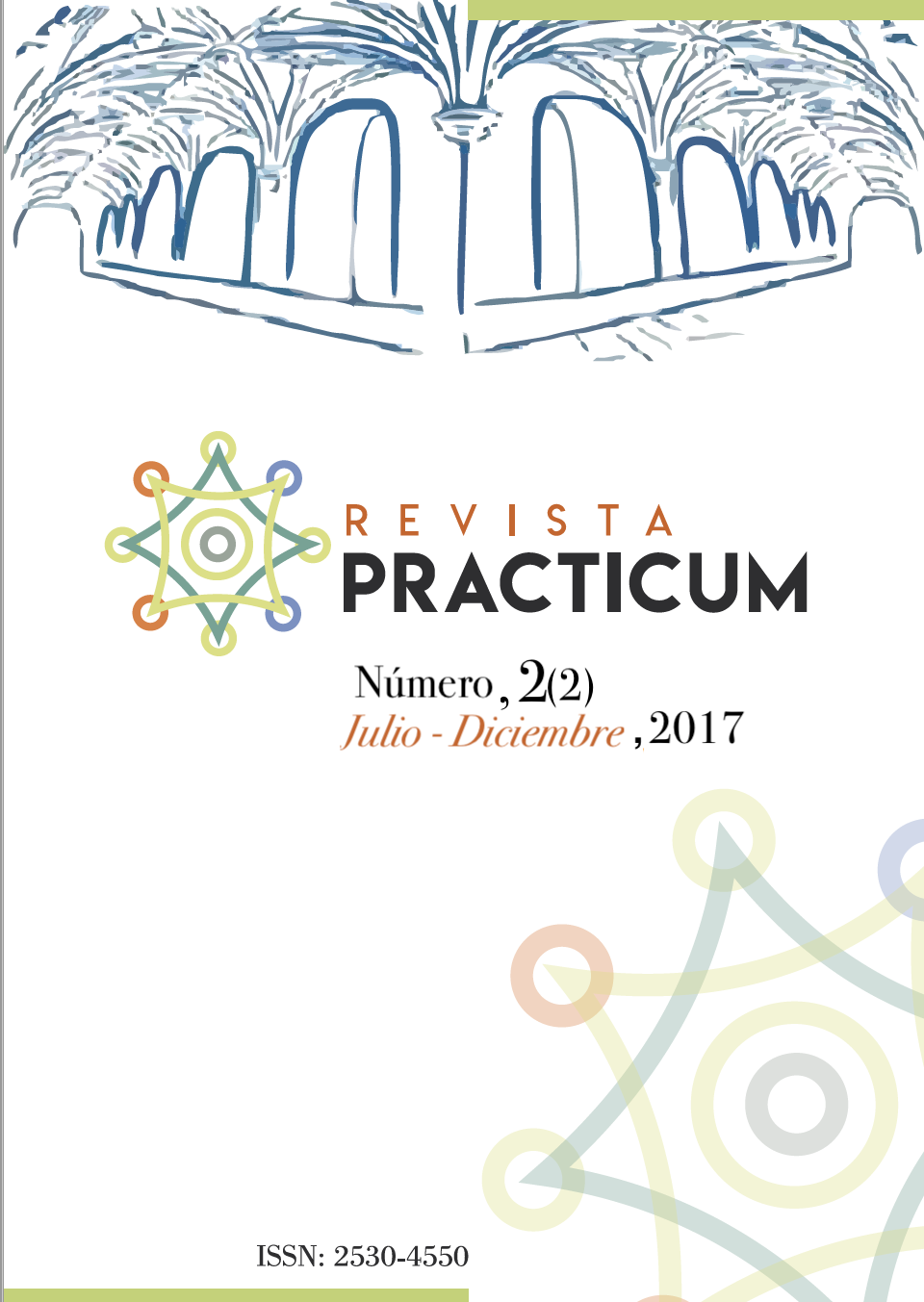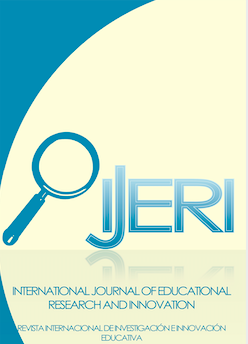Assessment of intervention designs in the Practicum as training and research instrument in the Master’s Degree in Teachers Training of Social Sciences
DOI:
https://doi.org/10.24310/RevPracticumrep.v2i2.9857Keywords:
Evaluation, prácticum, social sciences, didactic, technological innovation, educa-tional investigationAbstract
The present research tries to verify the pertinence of combining 360º evaluation method with federated digital rubric in evaluation processes of teacher training, in order to find efficient ways of identifying behavior patterns and significant variables that help the understanding of internal dynamics in small and large group; as well as providing the students, from the theoretical classroom experience prior to the prácticum, with well-founded elements of judgment regarding their future teaching work. The research was carried out on a group of 26 teachers in training, responsible both to construct the rubric of evaluation for the exhibition of the final work in small group and to apply it. The practical development of the methodology allowed to detect some unique individual / group / class relationships, as well as it helped the future teachers living in first-person evaluation strategies for the practice phase, giving them both a methodology and a valuation founded about it. Although at a stage still in development, the integration of methods seems to open new formulas of monitoring and evaluation; therefore, we believe that further research in this line will allow defining more complete strategies of work and evaluation in contexts of teacher training.
Downloads
Metrics
References
Aguilar-Cuesta, Á I., & Martínez-Romera, D. D. (2017). Utilidad de la metodología científica en la investigación educativa del profesorado en formación: Reflexióna partir de un estudio de caso en ciencias sociales sobre atención a la diversidad.CPU-E, Revista De Investigación Educativa, 1(1), 54-74. Retrieved from https://goo.gl/PH5TvZ
Agrawal, R., & Srikant, R. (1994). Fast algorithms for mining association rules in largedatabases. Proceedings of the 20th International Conference on very Large Data Bases, 478-499. San Francisco (EEUU): Morgan Kaufmann Publishers Inc
Alsina, Á. y Batllori, R. (2015). Hacia una formación del profesorado basada en la integración entre la práctica y la teoría: una experiencia en el Prácticum desde el modelo realista. Revista de Investigación en la Escuela, 85, 5-18.
Arribas-Estebaranz, J. M., Manrique-Arribas, J. C., & Taberner-Sánchez, B. (2016). Ins-trumentos de evaluación utilizados en la formación inicial del profesorado y su cohe-rencia para el desarrollo de competencias profesionales en los estudiantes: visión del alumnado, egresados y profesorado. Revista Complutense de Educación, 27(1), 237. https://doi:10.5209/rev_RCED.2016.v27.n1.45724
Bisquerra-Alzina, R., Martínez-Olmo, F., Obiols-Soler, M., & Pérez-Escoda, N. (2006). Evaluación de 360º: una aplicación a la educación emocional. Revista de Investigación Educativa, vol. 24, nº 1. Retrieved from https://goo.gl/NL5Gzd
Brutus, S., & Gorriti, M. (2005). La Evaluación Multifuente Feedback 360º. Revista de Psicología del Trabajo y de las Organizaciones, 21(3), 235-252. Retrieved from https://goo.gl/KeIIwG
Cabero, J., & Barroso, J. (2016). ICT teacher training: A view of the TPACK model. Revista Cultura Y Educación, 28(3), 633-663. https://doi:10.1080/11356405.2016.1203526
Cachón-Zalagaz, J., López-Manrique, I., Romero-Granados, S., Zagalaz-Sánchez, M.L., y González-González de Mesa, C. (2015). Opinión de docentes y estudiantes del máster de secundaria sobre las aportaciones de este a la formación del profesorado, la cali-dad docente y los intereses personales. Magister: Revista miscelánea de investigación, 27(1), p. 1-10 (2015). http://dx.doi.org/10.1016/j.magis.2015.03.001
Cano, E. (2015). Las rúbricas como instrumento de evaluación de competencias en educación superior: ¿uso o abuso? Profesorado, Revista De Curriculum Y Formación Del Profesorado, 19(2), 265-280. Retrieved from https://goo.gl/KeIIwG
Cebrián-de-la-Serna, Manuel, Cebrián-Robles, D., & Serrano-Puerto, J. (2015). Metodología para evaluar el impacto de las erúbricas y las anotaciones de vídeo en las prácticas externas. En Investigar con y para la sociedad (pp. 1457-1464). ISBN 978-84-686-6906-9. España: AIDIPE.
Cebrián-de-la-Serna, Manuel, & Bergman, M. E. (2014). Evaluación formativa con e-rúbrica: aproximación al estado del arte. REDU : Revista de Docencia Universitaria, 12(1), 15-22. Retrieved from https://goo.gl/bZfdmf
Cebrián-de-la-Serna, Manuel. (2014). eRubrics in cooperative assessment of learningat university/las eRúbricas en la evaluación cooperativa del aprendizaje en la universidad. Revista Comunicar (English Edition), 22(43), 153-160. Retrieved from https://goo.gl/XoEDZU
Cohen, L., Manion, L., & Morrison, K. (2011). Research methods in education (7. ed., rewritten, expanded and updated ed.). London [u.a.]: Routledge.
Curiel-Marín, E., & Fernández-Cano, A. (2015). Análisis Cienciométrico de Tesis Doctorales Españolas en Didáctica de las Ciencias Sociales (1976-2012). Revista Española de Documentación Científica, 38(4), e110. Retrieved from https://goo.gl/nCdtw6
Egbert, J., & Sanden, S. (2014). Foundations of education research (1. publ. ed.). New York [u.a.]: Routledge.
Esteve-Zarazaga, J. M. (2009). La formación de profesores: bases teóricas para el desarrollo de programas de formación inicial. Revista de educación, (350), 15-30. Retrieved from https://goo.gl/nuK1aO
Fuentes-Moreno, C. (2016). La formación inicial de los docentes de Historia en Educación Secundaria. Revisión del Máster de Formación del Profesorado. Revista Andamio, v. 2, nº 4, p. 35-49.
González-Ballesteros, M. y Fernández-Lozano, P. (2014). Procedimientos de evaluaciónde los formadores de profesores de primaria y de secundaria. Un estudio cualitativo. INIFAD Revista de Psicología, nº 1, vol. 7, pp. 171 - 178. http://dx.doi.org/10.17060/ijodaep.2014.n1.v7.788
González-Faraco, J. C., Pérez-Moreno, H. M., & Jiménez-Vicioso, J. R. (2011). El nuevomodelo formativo del profesorado de Educación Secundaria y su proceso de implantación en las Universidades Andaluzas. Fuentes: Revista de la Facultad de Ciencias de la Educación, 11, 67-85. Retrieved from https://goo.gl/GNbIWU
Laufer, B., & Ravenhorst-Kalovski, G. C. (2010). Lexical threshold revisited: Lexical text coverage, learners’ vocabulary size and reading comprehension. Reading in a Foreign Language, 22(1), 15. Retrieved from https://goo.gl/YNbDIz
Liu, B., Hsu, W., & Ma, Y. (1998). Integrating classification and association rule mining. Proceedings of the Fourth International Conference on Knowledge Discovery and Data Mining, 80-86. New York: Association for the Advancement of Artificial Intelligence.La evaluación de diseños de intervención para el Prácticum como instrumento de formación e investigación en el Máster de Profesorado de Ciencias Sociales.
Lorenzo-Vicente, J. A., Muñoz-Galiano, I. M., & Beas-Miranda, M. (2015). Modelos deformación inicial del profesorado de educación secundaria en españa desde unaperspectiva europea. Revista Complutense De Educación, 26(3) https://doi:10.5209/rev_RCED.2015.v26.n3.44866
Martinez, A., Mauri, T., Colomina, R., Agirre, N., Clarà, M., Bilbatua, M., Onrubia, J. y Lopez de Arana, E. (2016). Prácticas de reflexión colaborativa. Análisis de casos reales, relación teoría -práctica, comunidades de práctica. CIDUI, 2016, núm. 3, p. 1-11.
Martínez-Romera, D. D., Cebrián-Robles, D., & Cebrián-de-la-Serna, M. (2016). Assessment of teaching skills with e-rubrics in master of teacher training. JETT, 1(Extra), 120-141. Retrieved from https://goo.gl/xBFHgR
Morin, E. (2001). El método. La naturaleza de la naturaleza (1st ed.). Madrid: Cátedra.
Morin, E. (1999). Los siete saberes necesarios para la educación del futuro (1st ed.) UNESCO.
Perales-Montolío, M. J., Jornet-Meliá, J. M., & González-Such, J. (2014). Tendenciasen las políticas de formación y evaluación del profesorado en la educación superior en España. RIEE. Revista Iberoamericana de Evaluación Educativa, 53-64 Retrieved from https://goo.gl/qUxOKT
Pérez-Pueyo, Á, Hortigüela-Alcalá, D., & Gutiérrez-García, C. (2016). Reflexión sobre la evaluación en la formación inicial del profesorado en españa. en búsqueda de la concordancia entre dos mundos. IEYA, Revista Infancia Educación Y Aprendizaje, 2(2), 39-75.
Pérez-Torregrosa, A.B., Romero-López, M.A., Ibáñez-Cubillas, P. & Gallego-Arrufat, M.J. (2017). Grado de satisfacción, utilidad y validez de la evaluación con rúbricas electrónicas durante el prácticum. Revista Prácticum, 2(1), 60-79.
Quivy, R., & Van-Campenhoudt, L. (2005). Manual de investigación en ciencias sociales. México: Limusa.
Salerni, A. (2016). Il tirocinio universitario come strumento orientativo/formativo. Revista Practicum, Vol. 1(1) 80-98. ISSN 2530-4550
Schmitt, N., & Schmitt, D. (2014). A reassessment of frequency and vocabulary size in L2 vocabulary teaching. Language Teaching, 47(4), 484-503. https://doi:10.1017/S0261444812000018
Sepúlveda, M.P., Gallardo, M., Mayorga, M.J. & Madrid, D. (2017). La evaluación del Prácticum: un proceso clave en la construcción y reconstrucción del pensamiento práctico. ENSAYOS, Revista de la Facultad de Educación de Albacete, 32(1). http://dx.doi.org/10.18239/ensayos.v32i1.1368
Serrano-Rodríguez, R., & Pontes-Pedrajas, A. (2015). Nivel de desarrollo de las competencias y objetivos generales del máster formación del profesorado de enseñanza secundaria. Perfiles Educativos, 37(150) Retrieved from https://goo.gl/roZYOH
Sternberg, R. J. (1999). Thinking styles (1. paperback ed. ed.). Cambridge [u.a.]:Cambridge Univ. Press.
Tejada-Fernández, J. (2011). La evaluación de las competencias en contextos no formales: dispositivos e instrumentos de evaluación. Revista de Educación, (354), 341-342. Retrieved from https://goo.gl/kYlvx2
Valdés-Puentes, R., Bolivar-Botia, A., & Moreno-Verdejo, A. (2015). Una valoración de la formación inicial de profesores en España: El Máster en Educación Secundaria. Educação em Revista, 31(3) Retrieved from https://goo.gl/I1vi12
Viñao, A. (2013). Modelos de formación inicial del profesorado de educación secundaria en españa : Siglos XIX-XXI. Revista Española De Educación Comparada, (22), 19-37. http://dx.doi.org/10.5944/reec.22.2013.9321
Wood, P., & Smith, J. (2016). Educational research: Taking the plunge. La Vergne: Independent Thinking Press.
Downloads
Published
How to Cite
Issue
Section
License
Acceptance of the work implies that the author grants Revista Prácticum the exclusive rights to reproduce, distribute and sell his or her work worldwide, both in digital and paper formats, CD-ROM, etc.
Likewise, the authors shall grant Revista Prácticum the rights of dissemination, public communication on the Internet and IT networks, data buses, as well as any other portals or electronic devices for online consultation of its contents and extracts, under the conditions of the portal, repositories or databases where the work is stored.
Revista Prácticum allows authors to publish and disseminate their articles and works on their personal websites, research teams, institutional repositories and scientific databases. All this in accordance with the Creative Commons 4.0 License









8.png)








